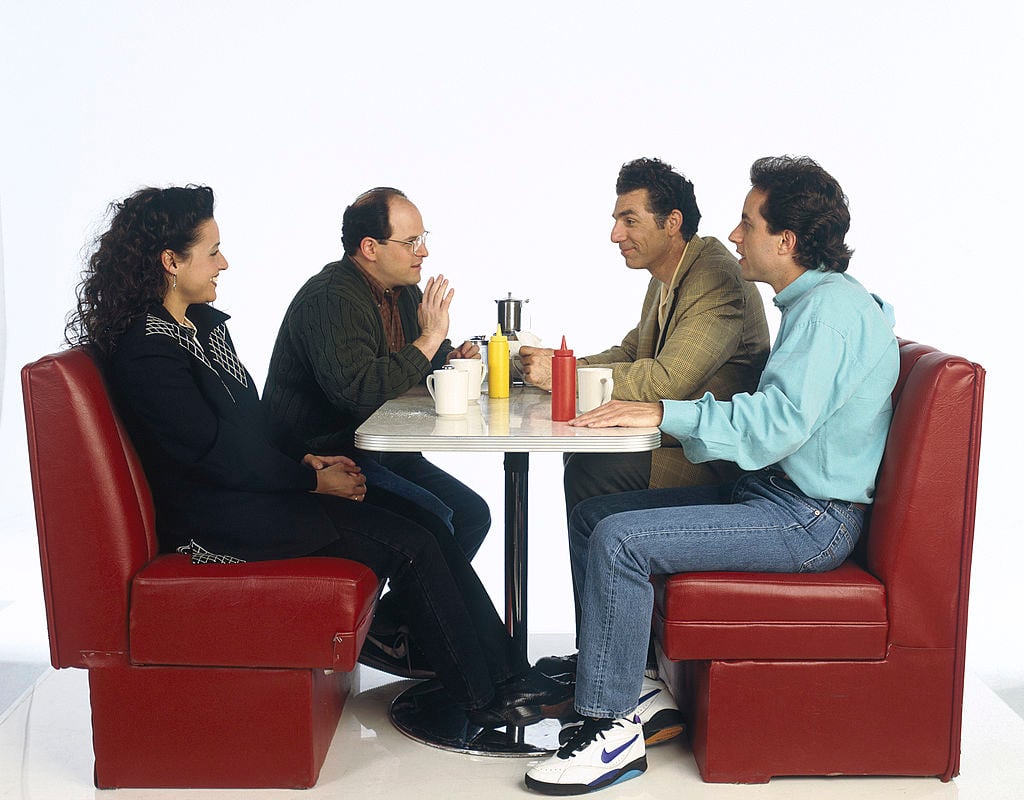7 Everyday Phrases You Didn’t Know Came From ‘Seinfeld’
Seinfeld is one of the most well-known comedies ever created and its legacy lives on today. Fans constantly reference the most popular scenes, episodes, and even one-liners. How many times have you heard someone exclaim, “No soup for you!”
But beyond the inside jokes and references, Seinfeld has also crept into the common vernacular and become a part of everyday language. Here are the most common Seinfeld words and phrases you never knew came from the show.

Calling someone a ‘close talker’
Even before the coronavirus (COVID-19) pandemic began and people had to stay 6 feet apart, Americans have felt extremely protective of their personal space. That’s why it’s so relatable — and hilarious — when Elaine’s boyfriend Aaron stands a little too close while talking and makes everyone uncomfortable.
Now it’s common to hear people referred to as “close talkers.” The show also did hilarious bits on both “high talkers” and “low talkers.”
Describing someone as having ‘man hands’
Plenty of the jokes on Seinfeld, a show that aired from 1989 – 1998, would be considered offensive by modern standards. Case in point: when Jerry dates a beautiful woman with unusually large hands, which she uses to rip open a lobster while they’re out to eat. Eventually, her larger-than-average appendages are a deal-breaker for Jerry.
And with that, the descriptor “man hands” became a thing.
Saying ‘not that there’s anything wrong with that’
Speaking of politically correct — throughout the entire series, all the characters on Seinfeld typically follow up their gripes with the deflective phrase, “Not that there’s anything wrong with that,” to soften the harshness of what they’re saying.
This phrase is still used today for the same reason.
Getting called out for ‘double-dipping’
People have been “double-dipping” — that’s biting a piece off something and then putting it back into a communal bowl of dip — even before Seinfeld broached the issue. But after the episode “The Implant,” double-dipping became part of the national conversation.
In the episode, George gets busted by his girlfriend’s brother Timmy when he’s double-dipping his chip while attending a wake. “That’s like putting your whole mouth in the dip!” Timmy says in horror. Eventually, the two get into a physical fight over the incident.
‘Yada, yada, yada’
Probably the best-known phrase on Seinfeld is the classic, “Yada, yada, yada,” which is a funnier way to say, “Et cetera and so on.” The line encompasses the offbeat, irreverent tone of the series that’s been described as being “a show about nothing.”
Having a ‘Festivus for the rest of us’
George’s dad Frank Constanza, brilliantly played by the late comedian actor Jerry Stiller, made up a secular holiday to celebrate on Dec. 23 as a stance against the commercialism of Christmas.
Even people who never watched Seinfeld have at least heard of the strange holiday Festivus, which again exemplifies that quirky nature of the show.
Being a ‘re-gifter’
Like with double-dipping, Seinfeld didn’t invent re-gifting, but they did popularize the phrase. In the episode, “The Label Maker,” Elaine gets offended when her hot dentist Dr. Whatley (Bryan Cranston) gives Jerry the label maker she had originally given him.
Hence, the term “re-gifting” became a popular way to describe unloading presents that you don’t like by giving them to other people.


